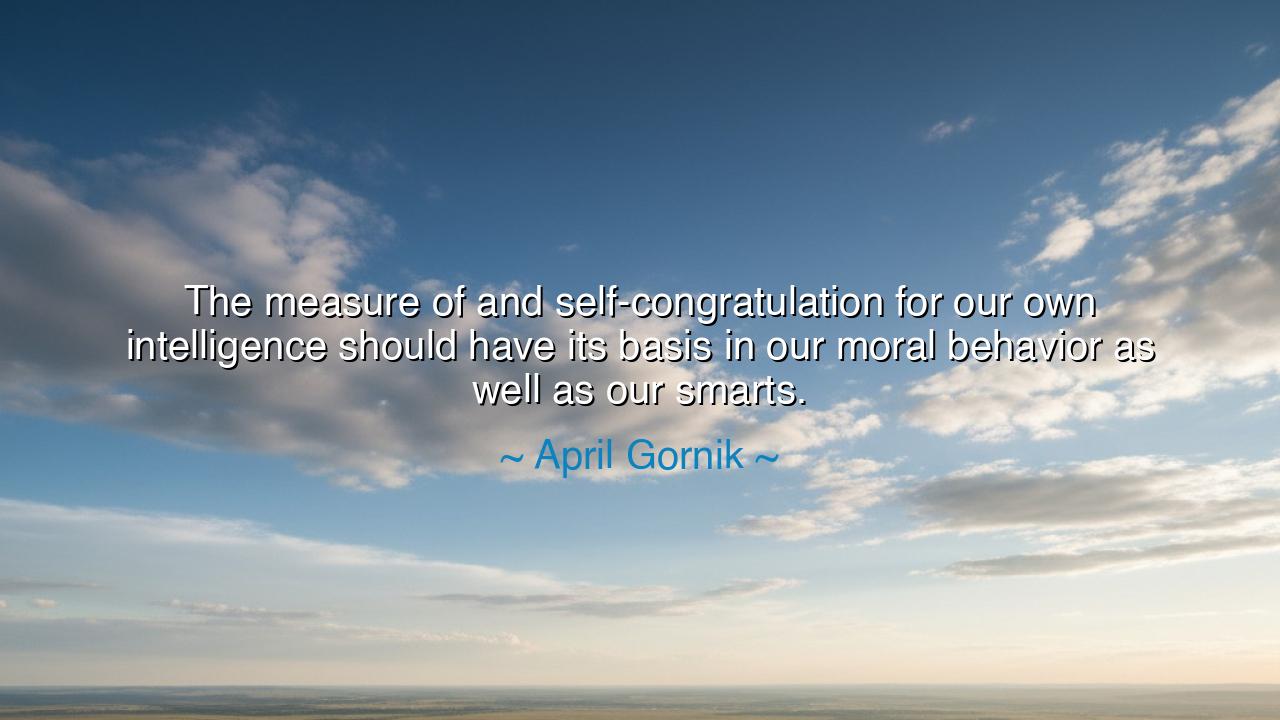
The measure of and self-congratulation for our own intelligence
The measure of and self-congratulation for our own intelligence should have its basis in our moral behavior as well as our smarts.






The words of April Gornik, painter and thinker, gleam with quiet righteousness and timeless insight: “The measure of and self-congratulation for our own intelligence should have its basis in our moral behavior as well as our smarts.” In this simple but profound statement, she reminds us that intelligence, that flame which humanity so proudly claims as its crown, is only truly radiant when joined with morality — the light of conscience that gives direction to reason. Without goodness, cleverness becomes cunning; without compassion, wisdom turns to arrogance. Her words echo through the ages, calling us to balance intellect with integrity, and to judge our greatness not by the sharpness of our minds, but by the kindness of our deeds.
The origin of this thought lies in the heart of Gornik’s own work — an artist deeply attuned to both the beauty and the moral responsibility of being human. In an age when knowledge expands faster than understanding, her words stand as a rebuke to a civilization that celebrates intelligence but often neglects virtue. She reminds us that intellect alone is not salvation; it is power, and power must be guided by a moral compass, lest it consume the very world it seeks to improve. Just as a painter must choose her colors wisely to create harmony, so too must we choose to unite brilliance with benevolence, lest our cleverness paint only chaos upon the canvas of life.
Throughout history, there have been men and women whose genius dazzled the world — and yet whose lack of morality brought it to ruin. Consider Oppenheimer, the “father of the atomic bomb,” who stood before the fire of his own creation and quoted the ancient words, “Now I am become Death, the destroyer of worlds.” His mind had touched the infinite, but his heart trembled before the consequences of its reach. In him, as in so many others, we see the truth of Gornik’s wisdom: that intelligence without moral restraint is a sword without a hilt — magnificent to behold, but deadly to the hand that wields it. Knowledge grants us power, but it is moral behavior that teaches us when, and how, to use that power rightly.
The ancients, too, understood this. In the dialogues of Plato, Socrates warns that knowledge divorced from virtue leads to corruption, for an intelligent man without goodness is merely a more dangerous fool. The Greeks called this harmony between wisdom and ethics sophrosyne — the balance of mind, heart, and action. To be wise, they said, was not merely to know, but to live rightly. And so Gornik’s words resurrect that ancient ideal for the modern age, reminding us that the true measure of intelligence is not found in one’s ability to conquer, manipulate, or profit, but in one’s capacity to do good, to lift others, and to create rather than destroy.
We see this truth lived most clearly in those who unite moral vision with intellectual strength — figures like Albert Schweitzer, who, though trained as a theologian and musician, devoted his genius to medicine and service in Africa. He saw that intelligence, however great, is wasted if it does not serve humanity. His life stands as a living answer to Gornik’s challenge: that every act of thought should be guided by conscience, every spark of innovation tempered by compassion. His brilliance was not measured by his intellect alone, but by the goodness that flowed from it.
Gornik’s wisdom also reminds us that self-congratulation — that subtle poison of pride — must be earned not by what we know, but by how we live. In an age obsessed with credentials, achievements, and displays of intellect, she calls us to humility. True intelligence, she suggests, is not loud or self-celebrating; it is gentle, self-aware, and ethical. It does not seek to dominate others, but to understand them. It is not proved by argument, but by character. For knowledge that serves only the self is sterile, but knowledge that serves the world becomes sacred.
And so, my children, the lesson is this: do not strive only to be clever — strive to be good. Let your mind shine, but let your heart guide it. When you achieve something, ask not only, “Was this wise?” but also, “Was this right?” The world does not need more intelligence without empathy; it needs intelligence made human by compassion. Let your knowledge heal, not harm; enlighten, not exploit. Be the kind of person whose intellect uplifts others, whose wisdom leaves peace in its wake.
For in the end, as April Gornik teaches, the worth of our minds is not found in what we think, but in how we act. Intelligence is a lamp — but morality is its flame. Without the flame, the lamp is cold, dark, and useless. Nurture both, and your light will not only shine — it will illuminate the path for those who walk after you.






AAdministratorAdministrator
Welcome, honored guests. Please leave a comment, we will respond soon